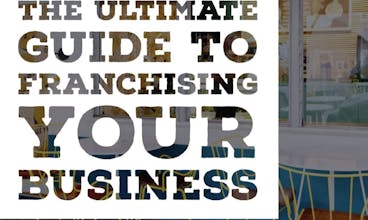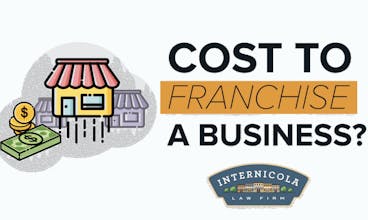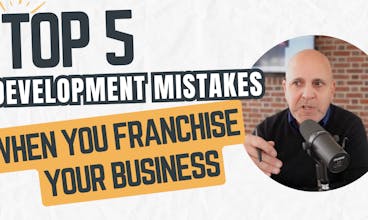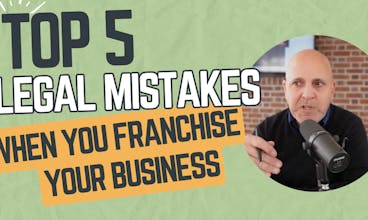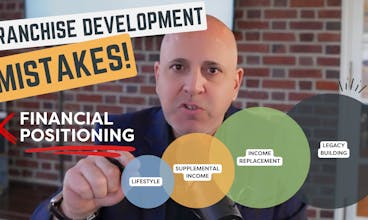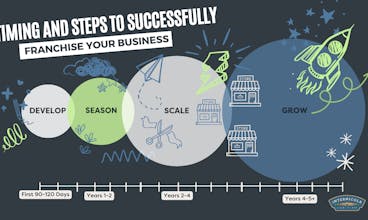Here’s what business owners need to know before answering unsolicited cold calls from franchise developers who say they’re going to “cover everything from A-Z”.
For most entrepreneurs, the idea of receiving a random call from a franchise developer interested in transforming your business into a franchise seems exciting – but too often, those cold calls can turn out to be anything but the opportunity of a lifetime.
“One of the most difficult phone calls I have is with struggling startup franchisors that usually reach out to us to help them with their FDD (Franchise Disclosure Document), to help them reboot their franchise program. And when we're having a conversation, there's so many common elements that come up. Number one, that they worked with a franchise developer. Number two, that the franchise developer cold-called them and convinced them to franchise their business – and that the franchise developer promised to cover everything for them,” says Charles N. Internicola, a franchise attorney with over 25 years of experience and the founder of The Internicola Law Firm.
While those promises can sound like a good deal to business owners looking to scale their brand, the claims made by franchise developers during unsolicited cold calls often end up being too good to be true – and can potentially leave startup franchisors with costly mistakes to correct in the future.
“For these hardworking business owners that haven't been involved in the franchising world before, it kind of makes sense. But it turns out that the franchise developers – the people that are cold calling – are really selling business owners either on the dream of franchising or the widget of franchising, meaning they're selling these business owners a package of everything, almost as if franchising were a widget. What ends up happening is that these business owners end up getting everything, but nothing, at the same time,” Internicola says.
Potential for bad advice and missed opportunities
When working with franchise developers that advertise their services through unsolicited cold calls, new franchisors face the possibility of receiving low-quality services and boilerplate materials that could need to be fixed by more qualified experts in the future as the brand grows – potentially costing more time, money, and even unit sales.
“The way these business owners enter the franchise world is really with the wrong expectations and the wrong tools to build a thriving franchise system,” Internicola says.
Some of the common issues Internicola says he’s seen with clients that have worked with franchise development firms after receiving cold calls have included poorly-drafted franchise operations manuals, low franchise sales, outsourced legal services from lawyers that weren’t directly accountable to the franchisor, and FDDs that didn’t reflect best practices – including some that lacked Item 19 financial performance representations, even when those disclosures should have been included based on industry standards.
“Best practice in the franchise world is you absolutely need an Item 19 financial performance representation. Now, there's exceptions to what I just said, but they're very limited. Why do you need it? You need to be able to tell franchise buyers how much you make and important KPIs (key performance indicators) about your business,” Internicola says.
Because some franchise development firms are sales-driven, Internicola says he’s also seen instances where developers have tried to sell business owners on franchising even when they weren’t in the right financial position to successfully franchise their business yet. In at least one instance, a developer even suggested to a client that they omit their Item 19 disclosures from their FDD – a practice Internicola believes is unethical.
“If your numbers aren't good enough to franchise, or if they're not good enough to publish an Item 19, then you shouldn't be franchising. That doesn't mean ever – it just means right now,” Internicola says.
Watch out for red flags in franchise developer cold calls
Because there are plenty of quality franchise developers working in the industry, startup franchisors need to know what to look for when selecting a team to guide them on their franchising journey – and what to steer clear of.
“You need to work with a team that's going to support you – that's going to help you integrate into the franchise world, the franchise community, provide you with tools and resources to learn franchising and to grow over time,” Internicola says.
For business owners that are contacted by a franchise developer through cold calls, being aware of best practices and common red flags can help prevent more serious issues in the future.
1. Be cautious about franchise developers that make cold calls
Because many franchise development firms are focused on selling packages, rather than building relationships and supporting their client base, business owners should exercise caution in general if they receive an unsolicited cold call from a franchise developer.
“My strong advice is don't work with anyone who cold calls you. I don't care who they are – a franchise developer, a lawyer. No one should be cold calling you. Everyone should be busy helping their clients grow, because that indicates their focus on long-term vision. If they're cold calling you, that means they're there to sell you,” Internicola says.
Rather than jumping to franchise a business after receiving a call from a franchise developer at random – a sales-driven practice that can cost valuable time and money – business owners should do thorough research and reach out directly to experienced franchising professionals with a track record of success in their specific area of the industry.
“Many times, these business owners are taking out SBA (Small Business Administration) loans and using other funds to pay the franchise developer. Now, investing in franchising is good, but it has to be for the right reasons – and you have to be paying for value,” Internicola says.
2. Be wary of one-stop-shop franchise development firms
Although it isn’t uncommon for franchising professionals to offer multiple services to clients, business owners that are considering franchising should be wary of companies that promise to do everything for them in-house.
“If they promise to do everything for you – FDD, legal, trademarks, accounting, marketing, sales, operations manual – that's a really big warning sign. In my opinion, it’s unethical; in my opinion, it could even be illegal. But it's a warning sign for you – I would not work with that type of organization,” Internicola says.
Instead, business owners should look for franchising professionals with good reputations that specialize in providing specific franchise-related services. At The Internicola Law Firm, legal services are offered alongside some franchise development services. For services that aren’t provided in-house, like franchise sales and accounting, the firm’s staff refers franchisors to trusted outside partners – a practice that ensures those professionals are directly accountable to their clients.
That level of accountability is important, especially when it comes to developers that claim to provide legal services for new franchisors but work with outside firms – a practice that establishes indirect relationships that could create legal headaches for franchisors later down the road.
“[Franchise developers] should be working with really great franchise lawyers who are directly accountable to you,” Internicola says, explaining that franchisors should work directly with a franchise attorney to ensure accountability.
3. Exercise caution if a franchise developer offers to sell franchises for you
Beyond promising to handle every aspect of the franchising process from start to finish, some franchise development firms take things a step further by offering to handle franchise sales for new franchisors – a process that is typically managed by the franchisor and their corporate team, often alongside an experienced franchise broker.
“What [franchise developers] also promise is that they're going to do your franchise sales. What they don't tell you is that franchise sales are difficult – they need to evolve over time,” Internicola says.
Although paying a franchise developer to create your sales website and manage your franchise sales process might sound appealing to busy business owners, franchise growth is strategic and requires an extensive investment of time and hard work over the long run.
“Franchise success and winning at franchising requires a long-term strategy. It requires a one, three, and five-year vision,” Internicola says, explaining that even though the process for franchising a business typically takes around 90 days, new franchisors should spend that time focusing on their brand positioning and developing long-term goals.
Once a franchise is established, Internicola says startup franchisors should focus on organic growth during their first two years in business – something franchise developers aren’t always upfront about when cold calling franchisors about franchise sales.
By taking time to grow slowly while learning the industry, new franchisors can “season” their brand while over-supporting their first few franchisees and developing a recipe for success to scale more rapidly later.
“The key is that you onboard [initial franchisees] and you over-support them. If they succeed, their numbers get reflected in your FDD and Item 19 – they validate your franchise offering. They set you up to grow. Years three to five are those acceleration and growth years,” Internicola says.
Doing things right … from the start
Because franchising success takes time and effort, Internicola stresses the importance of setting realistic expectations when it comes to franchising rather than trusting franchise developers that sometimes promise more than they can deliver.
“[Successful franchisors] apply a mindset of learning franchising themselves – meaning they'll start coming to broker conferences, they'll come to networking events and will meet up at national events. In years one and two, they focus on their organic growth. They focus on a powerful brand message, a powerful founder story, and they start building relationships with brokers,” Internicola says.
Although the first three years can be slow for new franchises, by beginning with the end in mind and developing the right mindset – including taking a hands-on approach to franchising – startup franchisors can achieve sustainable growth and success over the long run.
“I see it time and again. We have clients that started with no locations, or their only corporate ones, and have grown to over 100 [units]. And what you see is they franchised the right way from the start,” Internicola says.
While Internicola acknowledges there are excellent franchise developers in the industry, he stresses the importance of knowing what to look out for to avoid wasting time and money when franchising a business – especially when it comes to finding the right level of support and resources to meet long-term business goals.
“I think that's one of the biggest things that these developers harm when they're cold calling [business owners] like this – they're not giving you insight into the mindset and strategy for winning long-term at franchising, and that's what it's all about. You can succeed at franchising, but you need to do it the right way. You need to do it with a long-term vision,” Internicola says.
